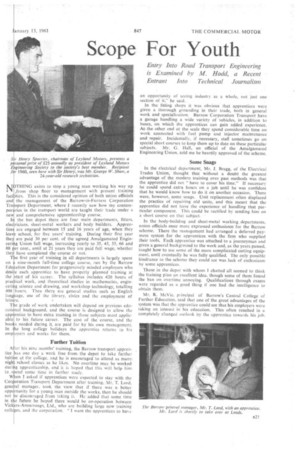Scope For Youth
Page 103

If you've noticed an error in this article please click here to report it so we can fix it.
Entry Into Road Transport Engineering is Examined by M. Hodd, a Recent Entrant Into Technical Journalism
THING exists to stop a young man working his way up
.from shop floor to management with present training fad i ities. This is the considered opinion of both union officialsand the management of the Barrow-in-Furness Corporation Tra sport Department, where I recently saw how my conternpor ries in the transport world are taught their trade under a ne and comprehensive apprenticeship course.
I the bus depot there are four main departments, fitters, eke ricians, sheet-metal workers and body builders. Apprentice are engaged between 15 and 16 years of age, when they
lea school, for five years' training. During their first year the are paid 30 per cent, of theagreed Amalgamated Enginceri g Union full wage, increasing yearly to 35, 45, 55, 66 and 80 •er cent., until at 21 years they are paid full wage, whether the have completed thecourse or not.
T e first year of training in all departments is largely spent
on nine-month full-time college course, run by the Barrow Edu ation Department for progressively minded employers who desi e each apprentice to have properly planned training at the startof his career.. The syllabus includes 420 hours of pra ical work, and theoretical studies in mathematics, enginceri g science and drawing, and workshop technology, totalling 400 hours. Then there are general studies such as English ianr age, use of the library, civics and the employment of
leist re. •
e grade of work undertaken will depend on previous eclunal background, and the course is designed to allow the entice to have extra training in those subjects most applicto his future career. The cost of the course, and the s .needed during it, are paid for by his own management. e long college holidays the apprentice returns to his oyers nod works for them,
cati app able boo In emp
Further Tuition
A ter his nine months' training, the Barrow transport apprentice las one day a week free from the depot to take further tuiti n at the college, and he is encouraged to attend as Many. nigh . school classes as he likes. No overtime may be worked dun i g apprenticeship, and, it is hoped that this will help him to s end some time in further study.
W en I asked if apprentices were expected to stay with the Cor oration Transport Department after training, Mr. T. Lord, gene :al manager, took the view that if there was abetter op rtunity for a young man outside the works, then he should not • discouraged from taking it. He added that some time, in t e future he hoped there would be co-operation between Vick rs-Armstrongs, Ltd., who are building large new training coil s, and the corporation. "I want the apprentices to have an opportunity of seeing industry as a whole, not just one section of it," he said.
In the fitting shops it was obvious that apprentices were given a thorough grounding in their trade, both in general work and specialization. Barrow Corporation Transport have a garage handling a wide variety of vehicles, in addition to buses, on which the apprentices can gain added experience. At the other end of the scale they spend considerable time on work connected with fuel pump and injector maintenance and repair. Incidentally, if necessary, staff sometimes go on special short courses to keep them up to date on these particular subjects. Mr. G. Hall, an official of the Amalgamated Engineering Union, told me he heartily approved of the scheme.
Some Snags
In the electrical department, Mr. I. Bragg, of the Electrical Trades Union, thought that without a doubt the greatest advantage of the modern training over past methods was that the apprentice did not "have to cover his time." If necessary he could spend.extra hours on a job until he was confident that he would know how to do it on another occasion. There were, however, some snags. Unit replacement often displaced the practice of repairing old units, and this meant that the apprentice did not have the experience of handling that particular component. This could be rectified by sending him on a short course on that subject.
In the body-building and sheet-metal working, departments, union officials once more expressed enthusiasm for the Barrow scheme. There the management had arranged a deferred payment system for the apprentices with the firm who supplied their tools. Each apprentice was attached to a journeyman and given a general background to the work and, as the years passed, taught how to use some of the more complicated cutting equipment, until eventually he was fully qualified. The only possible hindrance to the scheme they could see was lack of enthusiasm by some apprentices.
Those in the depot with whom I chatted all seemed to think the training plan an excellent idea, though some of them found the ban on overtime annoying. Qualifications through exams were regarded as a good thing if one had the intelligence to obtain them.
Mr. R. MeVie, principal of Barrow's Central College of Further Education, said that one of the great advantages of the system was that the apprentice could see that his employers were taking an interest in his education. This often resulted in a completely changed outlook by the apprentice towards his job.




















































































































































